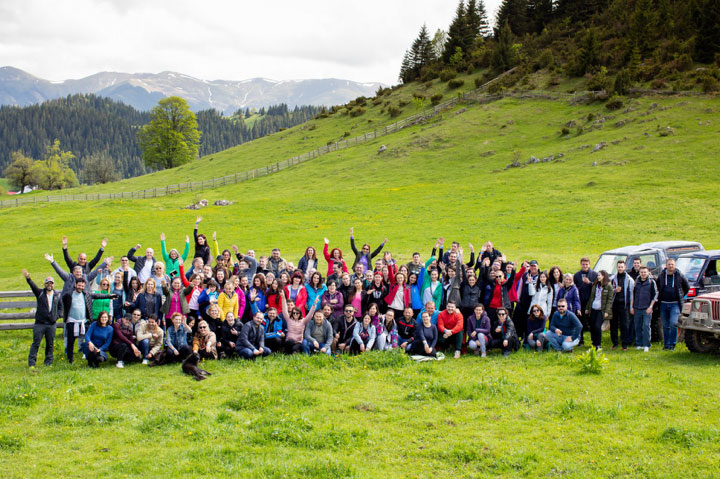
Stay in touch!
Realistic recovery options proposed by CITR for Romanian companies in difficulty
Bucharest, June 2, 2020 – According to CITR, leader of the insolvency market in Romania and part of Impetum Group, 70% of Romanian companies access insolvency three years after triggering the state of difficulty, significantly decreasing chances of business recovery. The economic effects of the health crisis make the total number of insolvent companies or companies in state of imminent insolvency to increase among companies with difficulties, further weakening the basic pillars of the Romanian economy. A stress test conducted by CITR based on information regarding the turnover, profitability and indebtedness, stock rotation etc. shows that the weakening financial indicators of impact companies (defined as companies with fixed assets higher than EUR 1mln) increases the number of companies in difficulty from approximately 50%, before the pandemic, to at least 70% as an effect of the crisis.
”Vulnerable companies are facing today a double crisis -that caused by the lack of liquidity and the accumulation of outstanding debts, and the one generated by the coronavirus pandemic, in a context in which there has been, for years, a core of over 2,000 impact companies of the 6,000 in imminent insolvency, which stagnated in the area of difficulty for four years. The main obstacle in overcoming problems in the Romanian business environment is the lack of access to capitalization, which affects their operational capacity, as well as access to contracts that involve advance guarantees bringing additional liquidity and streamlining the cash flow. Implemented in due time, the restructuring solutions together with access to capital sources and financing may be the solution for economic recovery", said Andra Olar-Caragea, CEO of CITR.
Recovery solutions proposed for Romanian companies in difficulty
The measures adopted by the Government so far have mainly targeted the postponement of payment for certain obligations, bank loans, utilities or rents. When the postponed obligations become due, companies will be already financially weakened as a result of a decline in activity and will face the obligation to pay debts related to the period of state of emergency, which will be quite difficult to cover. The decline in demand, which has continued after the end of the state of emergency, will most likely continue throughout 2020, with the possibility of being extended in some areas in 2021.
Recovery based on a strategic restructuring plan remains the most viable option for Romanian companies affected by the coronavirus pandemic. Arrangements with creditors, restructuring of budget obligations based on GO6, coopting a team with experience in crisis management, state investments in the form of debt to equity in strategic industries or insolvency are some of the recovery solutions for Romanian companies in difficulty in this period.
- Arrangements with creditors - Recommended at European level, encourages the continuation of company's business and reimbursement of debts through negotiation with creditors and the implementation of a restructuring plan. Relaxation of NBR rules on banks' obligation regarding the provisioning of exposures for companies accessing the arrangement procedure could create the necessary framework for granting loans to companies in difficulty.
- GO6 - Addressed to companies with financial difficulties, with debts to the state budget, GO 6/2019 allows the restructuring of budget obligations by preparing a restructuring plan and a test analyzing the degree of recovery of the budget creditor.
A combination between the 2 - arrangements with creditors, for the restructuring of bank and non-bank loans and GO6, for the restructuring of budget obligations, coordinated by a supervisor of a voluntary arrangement specializing in crisis management, together with the operational restructuring and business efficiency plan can ensure a 360° recovery.°.
- State involvement in a debt to equity solution, plus financing in the strategic industries such as agriculture, transport, automotive industry, chemical industry or energy, health and education, with the possibility to then sell those shares when an investor is identified. This operation does not involve actual cash allocation, but if subsequently the company were to need support for cash flow, from its position as shareholder, the state can allocate the amounts necessary to maintain in balance the strategic companies for the economy.
- Extension/adoption of a program similar to SME Invest for companies in difficulty - conditional upon a turnaround/restructuring plan. In absence of a similar investment or financing plan, companies already vulnerable before the onset of the crisis, which have suffered a decline in business, will face difficulties in complying with their payment obligations related to the period of state of emergency. For many companies, deferral measures are insufficient and should be supplemented with a second wave of solutions, of decreasing the obligations whose payment was deferred.
- Program to guarantee loans for companies - working capital loans for continuing the business of major companies, which also have a horizontal impact, in relation to other SMEs.
- Insolvency - Is after all a mechanism of protection for companies in difficulties, which shelters them for a while from the changes brought by an uncertain or unstable economic environment, when they no longer have liquidity to pay their debts. CITR studies show that once the procedure is accessed, 92% of entrepreneurs understand its benefits and 73% of entrepreneurs showed that they became better managers and more adaptable as a result of the insolvency experience.
”We welcome Government's initiative to create an investment fund with independent management to support companies. We are glad that, unlike the previous crisis, today there are solutions for companies in difficulty. State involvement to support Romanian companies must be accelerated. Today, after 30 years of capitalism, it's time to leave behind the problem of lack of money to the state budget and move to strategic, smart investments and collaboration with specialists trained in crisis management, to encourage entrepreneurs to reinvent themselves to keep up with the new reality", added Andra Olar-Caragea, CEO of CITR..

test
